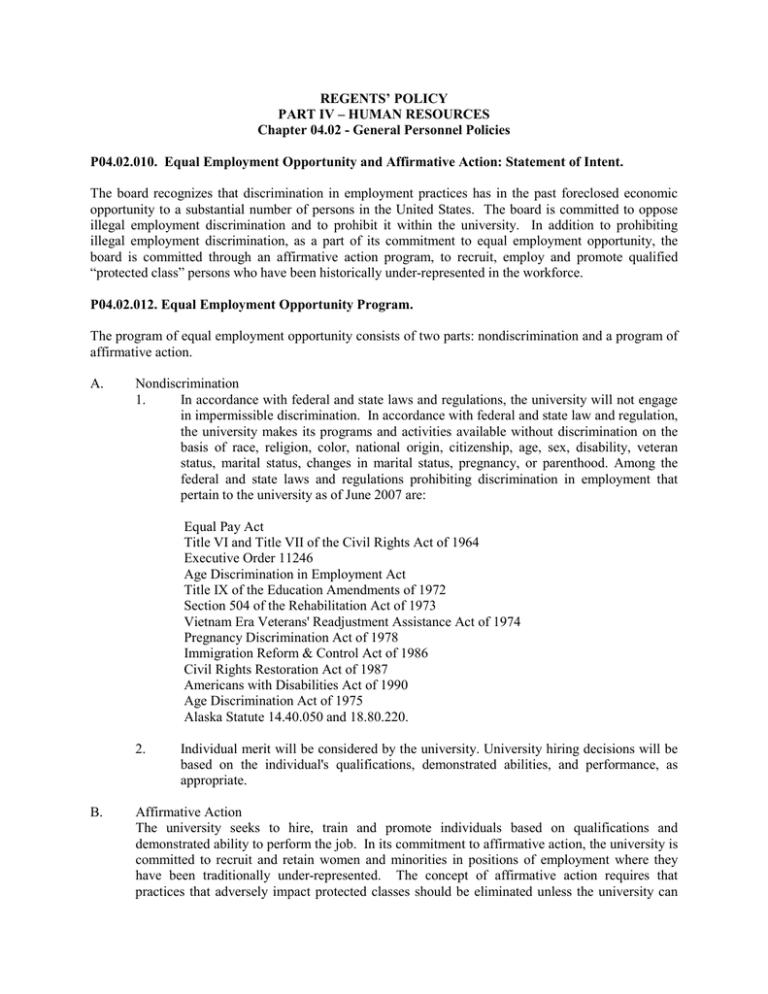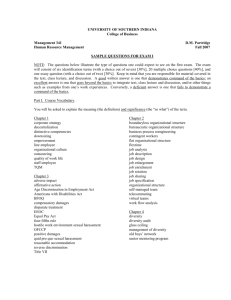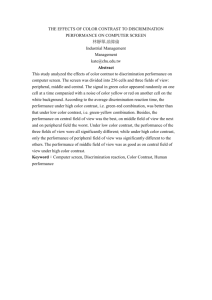
REGENTS’ POLICY
PART IV – HUMAN RESOURCES
Chapter 04.02 - General Personnel Policies
P04.02.010. Equal Employment Opportunity and Affirmative Action: Statement of Intent.
The board recognizes that discrimination in employment practices has in the past foreclosed economic
opportunity to a substantial number of persons in the United States. The board is committed to oppose
illegal employment discrimination and to prohibit it within the university. In addition to prohibiting
illegal employment discrimination, as a part of its commitment to equal employment opportunity, the
board is committed through an affirmative action program, to recruit, employ and promote qualified
“protected class” persons who have been historically under-represented in the workforce.
P04.02.012. Equal Employment Opportunity Program.
The program of equal employment opportunity consists of two parts: nondiscrimination and a program of
affirmative action.
A.
Nondiscrimination
1.
In accordance with federal and state laws and regulations, the university will not engage
in impermissible discrimination. In accordance with federal and state law and regulation,
the university makes its programs and activities available without discrimination on the
basis of race, religion, color, national origin, citizenship, age, sex, disability, veteran
status, marital status, changes in marital status, pregnancy, or parenthood. Among the
federal and state laws and regulations prohibiting discrimination in employment that
pertain to the university as of June 2007 are:
Equal Pay Act
Title VI and Title VII of the Civil Rights Act of 1964
Executive Order 11246
Age Discrimination in Employment Act
Title IX of the Education Amendments of 1972
Section 504 of the Rehabilitation Act of 1973
Vietnam Era Veterans' Readjustment Assistance Act of 1974
Pregnancy Discrimination Act of 1978
Immigration Reform & Control Act of 1986
Civil Rights Restoration Act of 1987
Americans with Disabilities Act of 1990
Age Discrimination Act of 1975
Alaska Statute 14.40.050 and 18.80.220.
2.
B.
Individual merit will be considered by the university. University hiring decisions will be
based on the individual's qualifications, demonstrated abilities, and performance, as
appropriate.
Affirmative Action
The university seeks to hire, train and promote individuals based on qualifications and
demonstrated ability to perform the job. In its commitment to affirmative action, the university is
committed to recruit and retain women and minorities in positions of employment where they
have been traditionally under-represented. The concept of affirmative action requires that
practices that adversely impact protected classes should be eliminated unless the university can
demonstrate a legally permissible basis. To accomplish the goals of its affirmative action
program, the university encourages employment applications from and makes special efforts to
recruit protected classes.
(06-06-07)
P04.02.014. Implementation.
The president and the chancellors are responsible for planning, implementing, and monitoring an effective
program of equal employment opportunity. The president and each chancellor will provide an annual
report to the board with regard to the effectiveness of their respective equal employment opportunity
program.
(06-20-97)
P04.02.020. Discrimination.
A.
The university will not permit or tolerate discrimination that creates an intimidating, hostile, or
offensive working or learning environment, or that interferes with an individual’s performance.
The university recognizes that conduct which constitutes discrimination in employment or
educational programs and activities is prohibited and will be subject to corrective and/or
disciplinary action.
B.
Discrimination refers to being adversely treated or affected, either intentionally or
unintentionally, in a manner that unlawfully differentiates or makes distinctions on the basis of
the individual’s legally protected status or on some basis other than an individual’s qualifications,
abilities and performance, as appropriate. The university will vigorously exercise its authority to
protect employees and students from discrimination by agents or employees of the university,
students, visitors and guests.
C.
Nothing contained in this policy will be construed or applied to limit or abridge any person's
constitutional right to freedom of expression or to infringe upon the legitimate academic freedom
or right of due process of any member of the university community. Principles of academic
freedom and freedom of expression require tolerance of the expression of ideas and opinions even
though they may be offensive to some. However, ideas and opinions must be expressed in a
manner that does not create an intimidating, hostile, or offensive working or learning
environment or unreasonably interferes with an individual’s performance. The university upholds
and adheres to principles of academic freedom and the laws prohibiting discrimination in
employment and education.
D.
Individuals who believe they have been subjected to discrimination are encouraged to bring this
behavior or action to the attention of an employee or faculty member who is in a position to assist
in addressing the concern. The affirmative action officer, human resources or student affairs
officer, or designee, as appropriate, will mediate disputes, receive complaints, obtain process
information, or discuss resolution options regarding discrimination complaints.
E.
The university cannot guarantee confidentiality in connection with complaints alleging
discrimination; however, all university employees and students are expected to make a reasonable
effort to protect the legitimate privacy interests of involved persons consistent with their
obligation to inform the accused.
F.
Nothing in this policy will be construed or applied to create a right to an award of damages or
other monetary compensation against the university or university employees beyond any existing
under state or federal law.
(06-06-07)
P04.02.022. Sexual Harassment.
A.
The university will not tolerate inappropriate sexual or sexually harassing behavior and seeks to
prevent such conduct toward its students, employees and applicants for employment. Violation
of this policy may lead to discipline of the offending party.
B.
Since some members of the university community hold positions of authority that may involve
the legitimate exercise of power over others, it is their responsibility to be sensitive to that power.
Faculty and supervisors in particular, in their relationships with students and subordinates, need
to be aware of potential conflicts of interest and the possible compromise of their evaluative
capacity. Because there is an inherent power difference in these relationships, the potential exists
for the less powerful person to perceive a coercive element in suggestions regarding activities
outside those inherent in the professional relationship.
C.
It is the responsibility of faculty and staff to behave in such a manner that their words or actions
cannot reasonably be perceived as sexually coercive, abusive, or exploitative. Sexual harassment
also can occur in relationships among equals as when repeated unwelcome advances, demeaning
verbal behavior, or offensive physical contact interfere with an individual's ability to work or
study productively. Consensual sexual conduct that unreasonably interferes with other
employees’ work or creates a hostile, intimidating or offensive working or learning environment
constitutes sexual harassment for purposes of this policy.
D.
The university is committed to providing an environment of study and work free from sexual
harassment and to ensuring the accessibility of appropriate procedures for addressing all
complaints regarding sexual harassment. Nothing contained in this sexual harassment policy will
be construed or applied to limit or abridge any person’s constitutional right to freedom of
expression or to infringe upon the legitimate academic freedom or right of due process of any
member of the university community.
(06-06-07)
P04.02.024. Consensual Sexual Relations.
A.
Faculty members or staff who engage in sexual relations with students enrolled in their classes or
subject to their supervision, even when both parties have consented to the relationship, will be
engaging in unprofessional behavior.
B.
Supervisors who have authority or control over employees and engage in sexual relations with
those employees, abuse their power, even when both parties have consented to the relationship.
(06-06-07)
P04.02.026.. Limitation of Liability.
Nothing in P04.02.020 - 04.02.026 will be construed or applied to create a right to an award of damages
or other monetary compensation against the university or university employees beyond any existing under
state or federal law.
(08-15-97)
P04.02.030. Reasonable Accommodation for People with Disabilities: Prohibition Against
Discrimination on the Basis of Disability.
All members of the university community have a right to a working and learning environment free of all
forms of illegal discrimination including discrimination against people with disabilities. It is the
university's intent that no employee, or user of university facilities, be subjected to unlawful
discrimination based on disability.
(06-06-07)
P04.02.032. Definitions.
In P04.02.030 - 04.02.038, unless the context requires otherwise:
A.
"ADA" means the federal law known as the Americans with Disabilities Act of 1990, as
amended;
B.
"ADA coordinator" means the individual designated to administer the university's disability
discrimination compliance program;
C.
"affirmative action officer," or “AAO” means the regional affirmative action officer, director, or
designee, whichever reference is applicable;
D.
"complainant" means the person or persons asserting a complaint;
E.
"person with a disability" means an individual who:
1.
has a documented physical or mental impairment that substantially limits a major life
activity;
2.
has a documented record of a physical or mental impairment that substantially limits a
major life activity; or
3.
is regarded as having a physical or mental impairment that substantially limits a major
life activity;
F.
"reasonable accommodation" means the process of modifying or adjusting the work environment
to reasonably accommodate the functional limitation caused by a disability;
G.
“reasonable accommodation resolution" means the process whereby the ADA coordinator or
AAO facilitates the development of an appropriate reasonable accommodation; and
H.
"respondent" means the university employee, officer, agent, or representative whose act or failure
to act is being disputed.
(06-06-07)
P04.02.033. Request for Accommodation.
A.
The purpose of this process is to educate the person or persons involved about the applicable
provisions of the law, to provide a non-retaliatory environment to determine accommodations,
and to initiate change in behavior, practice, or treatment that will lead to a positive work
environment.
B.
A university employee who believes that the employee requires accommodation must present
medical documentation to the AAO or designee.
C.
An informal complaint to the AAO must state the employee's name, and provide a detailed
description of the practice or action that allegedly requires accommodation or constitutes
discrimination on the basis of disability.
D.
No person who acts in good faith will be subject to restraint, interference, coercion, reprisal, or
retaliation for initiating a request or complaint or participating as a witness or in another capacity
in any proceeding designed to foster compliance with this policy and university regulation.
E.
In attempting to informally determine an appropriate accommodation or resolve a complaint, the
AAO will obtain and clarify relevant information from the employee, the supervisor, the regional
personnel director, and other involved persons. The outcome of a reasonable accommodation
generally will not include documentation copied to the personnel file or widespread distribution
of decisions regarding any accommodations made. However, any documentation relating to a
disability complaint will be kept in a separate file apart from the employee's personnel file.
(06-06-07)
P04.02.034. Formal Complaint.
An employee who claims to have been subjected to discrimination based upon a disability and who has
exhausted the reasonable accommodation process may initiate a written formal complaint. Formal
complaints must be presented to the ADA coordinator and must include, at a minimum, the following
information:
A.
the name of the complainant and the respondent;
B.
a clear and concise description of the event and the alleged discriminatory action or conduct;
C.
an explanation of the impact upon the complainant of the alleged discriminatory action or
conduct;
D.
a summary of attempts taken to resolve the complaint informally; and
E.
the remedy requested.
(06-06-07)
P04.02.035. Determination of Formal Complaint.
A.
The AAO and ADA coordinator are responsible for ensuring compliance with the provisions in
the Americans with Disabilities Act and other applicable laws in their efforts to coordinate
disputes involving people with disabilities within the university.
B.
The ADA coordinator will determine whether there is reasonable basis to justify relief in the form
of a reasonable accommodation. If so, the ADA coordinator will identify appropriate solutions,
including recommendations for reasonable accommodation, and report those recommendations to
the respondent's immediate supervisor, regional human resources office, and other appropriate
administrative officers.
(06-06-07)
P04.02.036. Remedies.
A.
Unjustified delay or refusal to implement the solutions or the reasonable accommodations
recommended by the ADA coordinator may lead to referral to an appropriate administrative
officer to obtain proper and timely action. An employee who delays or refuses unjustifiably to
implement the recommendations is subject to disciplinary action.
B.
If the ADA coordinator determines that there is not just cause to support a disability
discrimination complaint, the coordinator will notify the complainant in writing of that
determination and the reason therefore. The complainant may appeal the ADA coordinator's
determination or the respondent’s alleged improper action by submitting a grievance to the
grievance council at Step 3 of the grievance resolution process contained in P04.08 and R04.08.
The grievance must be filed within 45 working days of the date on which the complainant
received the ADA coordinator's written determination.
(06-06-07)
P04.02.037. Confidentiality.
The university cannot guarantee confidentiality. However, all university employees are expected to make
a reasonable effort to protect the legitimate privacy interests of involved persons.
(06-06-07)
P04.02.038. Records Retention.
The affirmative action officer and ADA coordinator will maintain appropriate records concerning
complaints brought under the provisions of the informal and formal complaint processes. These dispute
resolution records are considered confidential under federal law and will be maintained accordingly.
(05-04-99)
P04.02.040. Drug-Free Workplace.
A.
The unlawful manufacture, distribution, dispensing, possession, or use by an employee of a
controlled substance as defined in Schedules I through V of Section 202 of the Controlled
Substances Act (21 USC 812), and as further defined by regulation at 21 C.F.R. 1308.11 1308.15 is prohibited in any workplace of the university.
B.
All employees will abide by the terms of this policy as a condition of their employment and will
notify the university of any criminal drug statute conviction for a violation occurring in the
workplace no later than 5 working days after the conviction. Within 30 days of receiving the
notice of conviction, the university will take appropriate personnel action against the employee as
prescribed by university regulation, up to and including termination, or require the employee to
participate satisfactorily in a drug abuse assistance or rehabilitation program approved for such
purposes by a federal, state, or local health, law enforcement, or other appropriate agency.
C.
The university regulation implementing this section must provide for publishing a statement to
notify employees of this policy and to establish a drug-free awareness program to inform
employees about: the dangers of drug abuse in the workplace; the university's policy of
maintaining a drug-free workplace; any available drug counseling, rehabilitation, and employee
assistance programs and the penalties that may be imposed upon employees for drug abuse
violations occurring in the workplace.
D.
Each employee will be provided a copy of this policy and accompanying university regulation.
(06-20-97)
P04.02.050. Employee Alcohol and Controlled Substances Testing.
A.
The university regulation implementing P04.02.040 and this section will at a minimum provide
for the establishment of alcohol and controlled substances testing programs as required by law;
the imposition of penalties on employees when tests exceed allowable levels; compliance with
reporting and record keeping requirements; dissemination to affected employees of educational
materials explaining the legal requirements, this policy and university regulation; and provide for
B.
appropriate staff training and employee assistance programs. Collective bargaining units
representing affected university employees will be given written notice concerning the
availability of this information.
All employees subject to laws mandating alcohol and controlled substances testing will comply
with such laws, this regents’ policy and university regulation as a condition of their employment.
(06-06-07






